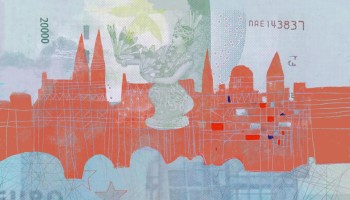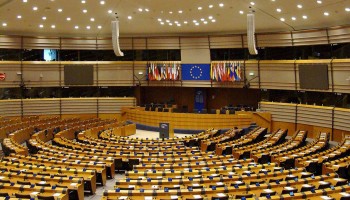Madagascar — sometimes known as the “world’s eighth continent” — is a naturalist’s paradise. More than 80 percent of the flora and fauna on the island can be found nowhere else on earth.
Among these rare species are two endangered variants of the rosewood tree. Like other members of the Dalbergia family, the slow-growing Madagascar rosewood is prized for its fragrant, fiery-colored timber, which is used in fine furniture.
But Madagascar’s rosewood trees are in danger. Many grow in underdeveloped places like the northeastern Sava region, where logging is one of the few dependable sources of income. Said Gilbert, a former rosewood logger, says he earned between $2 and $3 cutting down two trees a day.
Gilbert is just trying to get by. But while locals like him subsist on rice and bushmeat, the 300-year-old trees they fell generate thousands of dollars in profits for businessmen at home and abroad.
Most loggers never meet the financiers, traders, and buyers who deal in the timber, which is so sought-after that it sells for $20,000 to $25,000 per ton. Nor are they likely to ever see the finished product — mostly high-end furniture for China’s growing elite.
Logging rosewood in Madagascar is a big business. According to estimates from 2013, between $250 and $300 million in exotic timber, mostly rosewood, was illegally exported from the island that year. There have been few reliable figures since then.
Nor are there statistics on how much of the forest has been destroyed. But mass deforestation, which is caused by farming as well as logging, is happening. For example, confidential documents seen by reporters show that 80 percent of the island’s forest-dwelling lemurs, the only population in the world, is gone.
Everything about the rosewood business, from logging to exporting, is illegal under international regulations on endangered species.
But instead of protecting natural resources, Madagascar’s government is colluding with the timber barons who profit from the illegal trade.
To learn more, reporters for the Organized Crime and Corruption Reporting Project (OCCRP) talked to locals, examined secret government documents, and went undercover, posing as representatives of a Chinese buyer.
Their investigation pieces together how the rosewood trade works, how it’s protected by powerful insiders, and how its operators evade detection. For example, reporters found that rosewood sometimes leaves Madagascar disguised as vanilla, the island’s other key cash crop (which is unregulated).
Meanwhile, the government appears to be unwilling even to identify the extent of the island’s illegal rosewood trade, let alone to curb it.
As a result, forests are being devastated and precious trees shipped away by the thousands just to enrich a select few profiteers, leaving only scraps for the loggers who cut them down.
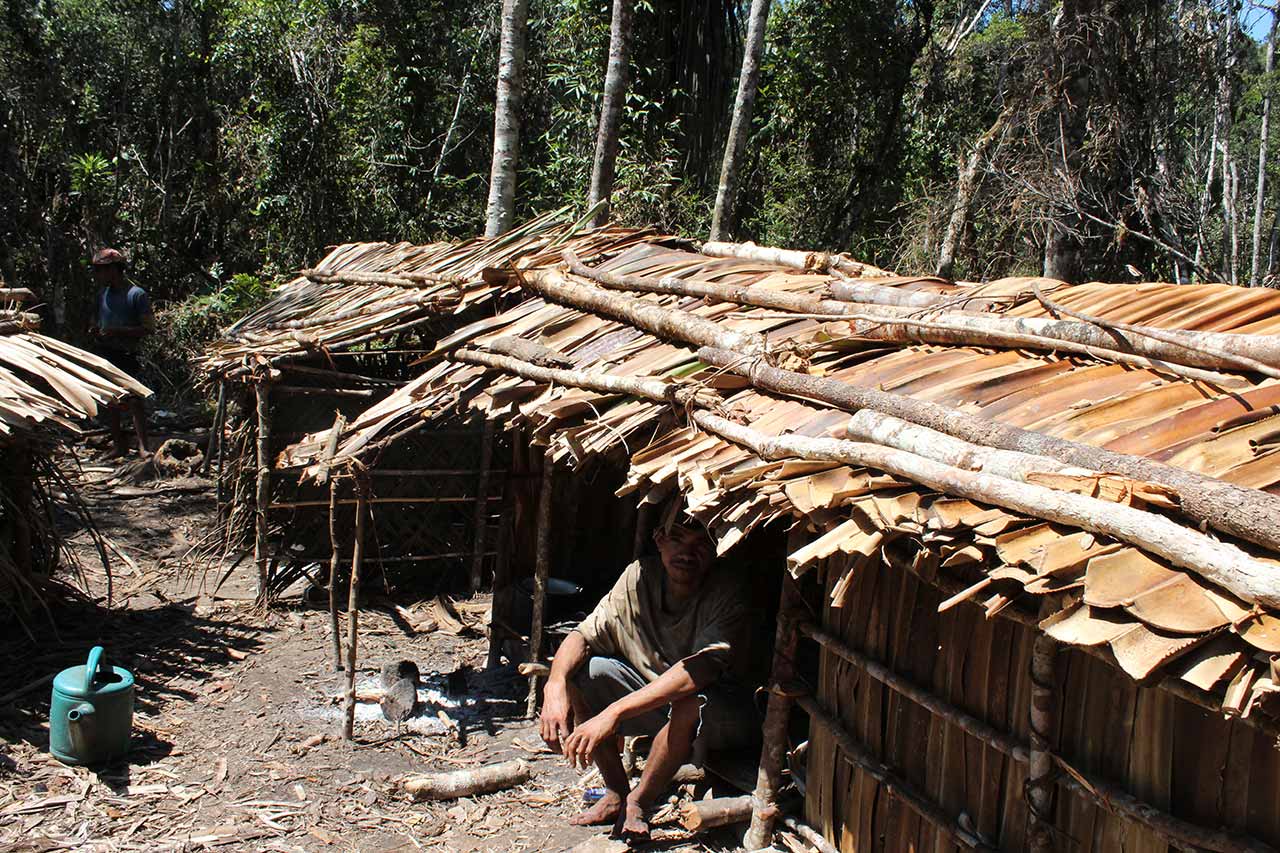 A logger in the Sava Region, Madagascar. Credit: OCCRP
A logger in the Sava Region, Madagascar. Credit: OCCRP
No Calm after the Storm
The destruction of Madagascar’s lush forests plays a crucial role in the country’s political landscape.
Since winning independence from France in 1960, this nation of 25 million has largely been ruled by the Merina, its most numerous single ethnic group. President Marc Ravalomanana, a Merina, was in control for much of the 2000s. While his rule saw some economic growth, public anger over rampant corruption and income inequality has simmered.
That anger erupted into violent protests in areas like Sava, which has vast coastlines and dense national parks but little development. These are the homelands of the “timber barons,” prominent businessmen who have been illegally exporting rosewood for years.
The trade started to skyrocket around 2007, when a series of storms and cyclones devastated Madagascar’s forests. Some traders seized the chance to claim that their stockpiles had come from trees felled by natural causes rather than illegal logging. And soon enough, President Ravalomanana succumbed to their demands, making an exception to restrictions for 13 of the best-connected traders by granting them licenses to export wood felled by “acts of God.”
Exports boomed. Between 2009 and 2010, more than 1,500 containers of wood, worth over $150 million, were authorized for export in contravention of international regulations.
Some of the traders became enormously rich. A few even became kingmakers, helping finance a military coup in March 2009 that toppled Ravalomanana. Andry Rajoelina, the former mayor of the country’s capital, Antananarivo, came to power as head of a transitional government.
Under his rule, trading became so pervasive that a proposed EU resolution noted the discovery of “a large, unexplained stash of rosewoods logs … at the presidential palace.”
Among the officials overseeing trade for the government was Minister of Finance Hery Rajaonarimampianina, who signed off on shipments of timber ostensibly felled by the storms. When the transitional government dissolved in 2014, Rajaonarimampianina stepped into the presidency and remains in office today.
With him in power, the timber barons’ wealth and power have only grown, and the country’s political establishment remains closely intertwined with the logging industry.
Some traders are even in parliament. The president’s former political fundraiser, Jean Laisoa, for example, represents his home region of Sava in the National Assembly and sits on committees that monitor natural resources, finance, and the judiciary. A confidential government document seen by reporters describes Laisoa as a key rosewood trader. He declined to comment for this story, citing his sensitive role as a “rosewood operator and politician.”
According to Mamy Rakotoarijaona, director of operations at Madagascar National Parks, the people who are supposed to preserve the forests don’t have the resources or political clout to match such powerful interests. A few unarmed officers who don’t even have the authority to arrest illegal loggers are the sole protection for major rainforests, he said, adding that it can take days for help to arrive when traffickers come to these remote areas.
Meanwhile, the Rajaonarimampianina government seems bent on legalizing trade in rosewood.
In August 2017, it drafted a business plan to propose to the Convention on International Trade in Endangered Species of Wild Fauna and Flora (CITES) at its annual meeting, held that winter in Geneva. The aim was to allow the export of hundreds of thousands of stockpiled rosewood logs in order to generate funds to protect the island’s rainforests.
Keeping a Promise
CITES is an international agreement in effect since 1975. Its primary goal is to ensure that the trade in natural resources and wildlife does not endanger fragile ecosystems or the fauna that depend on them. Governments participate in CITES on a voluntary basis, but the regulations are legally binding. Various species of rosewood (under the genus Dalbergia) are protected under CITES agreements. Since 2013, CITES has banned all trade in rosewood from Madagascar.
There was just one problem: Other CITES members, such as the United States, questioned how stockpiled logs felled by storms could be distinguished from those taken by illegal loggers.
Indeed, the Rajaonarimampianina government’s preparations for the CITES summit suggested just how little oversight it has over Madagascar’s rosewood stockpiles.
Reporters learned that a few weeks before the meeting, the government’s Inter-Ministerial Coordination Body spent $250,000 to do an audit of some 300,000 stockpiled logs. This was the wood they had hoped to convince CITES to allow them to sell.
But according to a confidential government document, just 10 of the 101 recognized stockpile owners allowed inspectors onto their premises.
Owners zealously guard their valuable logs, paying private security guards — or sometimes state police — some $80 to $100 a month to watch over the wood.
“In fact,” the report notes, “the majority of these stockpiled logs remain outside the control of the government.”
The government likely doesn’t even have the number of logs right. Gendarmes stationed in Sava, rosewood traders, and government officials all told reporters that logging companies routinely overestimate their stock — possibly to allow additional logs to be added later.
On top of that, one government document shows that the 101 owners whose stockpiles are officially recognized represent just about a third of those known to exist.
 Hery Rajaonarimampianina meets supporters at a polling centre in the Tsimbazaza district of Madagascar's capital Antananarivo in the run up to presidential elections in 2013. Credit: Thomas Mukoya / Reuters
Hery Rajaonarimampianina meets supporters at a polling centre in the Tsimbazaza district of Madagascar's capital Antananarivo in the run up to presidential elections in 2013. Credit: Thomas Mukoya / Reuters
From the Forest to the Sea
To see how the rosewood trade works, reporters created a fake Chinese company called Imperial Africa Trading operating out of a tax haven in the United Arab Emirates (UAE). Posing as its representatives, they spoke with a rosewood trader known as the “big boss” who uses a network of companies on the island.
The trader, who cannot be named to protect his safety, explained that 80 percent of the rosewood his network exports — almost entirely to Asian clients — is logged directly from the forest, rather than being sourced from existing stockpiles.
Fresh logging is preferable, he said, because stockpiled logs are frequently marred by time or paint, indicating that they’ve been flagged by the government.
His clients pay about 40 percent of the price up front. This ensures that his network has sufficient finances to obtain the logs and move them to port.
The full price is determined not only by the quality of the rosewood itself, but also the risk involved. It can be halved or even quartered if the buyers have local protection or a politically powerful friend to guarantee the shipment. And many Asian buyers do — demonstrating the extent to which they have infiltrated Madagascar’s economy and its political establishment.
The trader also offered an alternate, more secretive method of payment in which buyers could send their payments to the account of a registered commodity brokerage and investment company, Mercathon Capital. (The company did not respond to separate requests for comment.)
Once exported, Madagascar rosewood doesn’t go directly to Asia. Rather, it is shipped through other destinations — and the trader was happy to go through the options.
One possibility is to use larger ports in places like Mauritius or Mombasa in Kenya. Since these facilities are relatively well equipped to inspect cargo, friendly local networks would be required to protect it from detection.
Another option, the trader said, is to send the wood to smaller “dark ports” on nearby Indian Ocean islands such as Reunion, Mayotte, and Comoros, where it can more easily be moved to other vessels and its country of origin disguised.
About 40 percent of Madagascar’s registered timber traders document Mauritius as the destination for their wood. But according to UN commodity trading data, there is little evidence that the timber ever physically arrives. The island is a tax haven, and therefore an ideal site from which to re-export merchandise to other destinations.
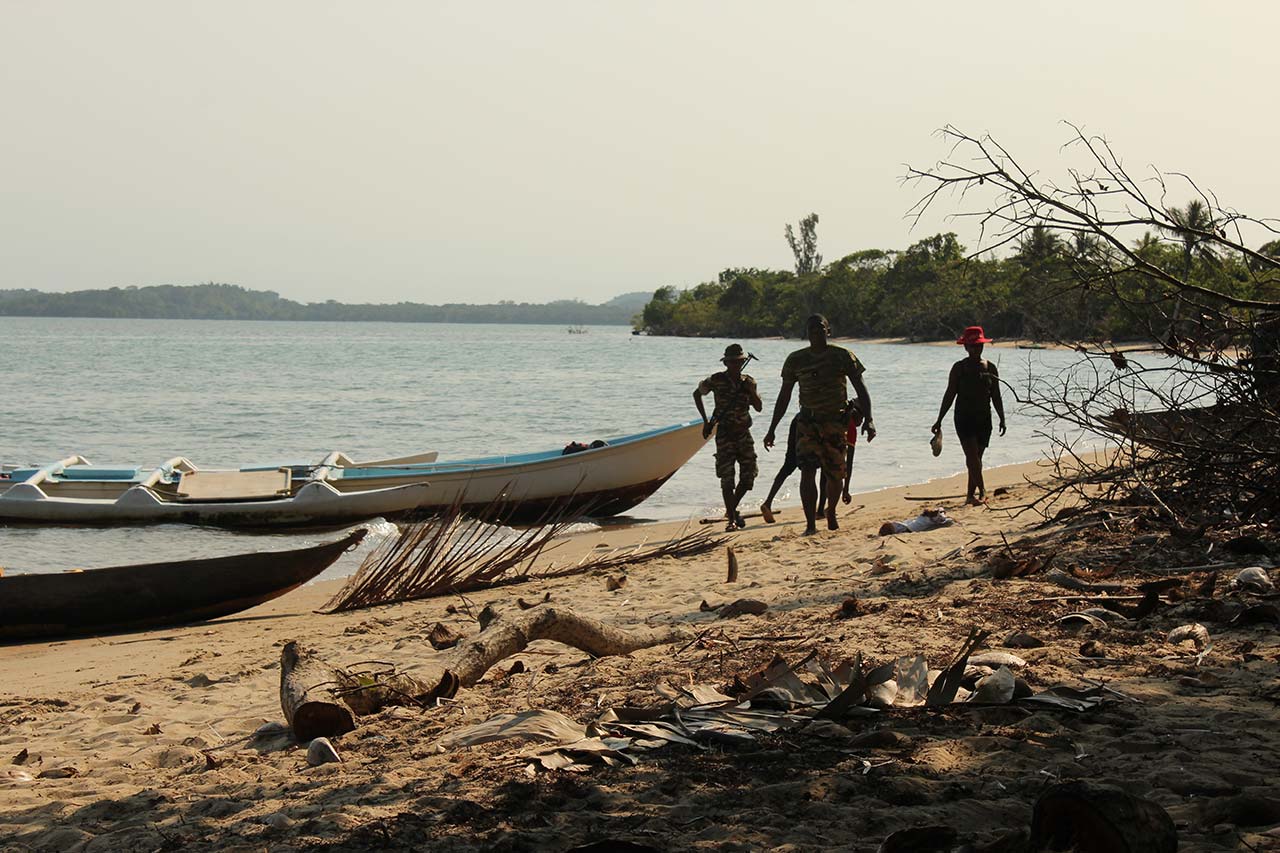 Canoes on a beach in the Sava Region, of the type used to transport rosewood from nearby national parks. Credit: Khadija Sharife / OCCRP
Canoes on a beach in the Sava Region, of the type used to transport rosewood from nearby national parks. Credit: Khadija Sharife / OCCRP
Getting Rosewood Off the Island
But how does the banned wood leave Madagascar in the first place?
The rosewood trader explained that traffickers prefer to use the island’s smaller ports that have limited ability to monitor shipments. In fact, large vessels need not enter Madagascar’s ports at all. Instead, smaller boats can be used to take the logs out to them, avoiding the need to document cargo and record ships entering the harbor.
Ndranto Razakamanarina, president of Alliance Voahary Gasy, the island’s leading environmental NGO, confirmed this, adding that private boats owned by trafficking networks make it difficult to acquire information about the trade.
Moreover, one owner of a 200-ton rosewood stockpile (about 10 containers) told reporters that several timber barons own or control their own shipping companies, making it easy to keep the trade secret.
Whichever shipping company is used, rosewood smuggling is a risky business once containers reach the high seas. If foreign authorities seize the timber, smugglers lose their investment with no prospect of getting the money back. But those problems only start outside Madagascar, Razakamanarina said.
On the island itself, their connections protect them from scrutiny. “All you need is a political friend,” he told reporters. “One simple call to the office of the presidency and it’s business as usual.”
As for the preferred point of departure, the trader recommended Vohemar, a smaller port in Sava, over the larger, busy port city of Toamasina (also known as Tamatave). To ensure a smooth shipment, he said, his contacts in the “police, army, customs” and the relevant “regional leaders” would be informed of the date of the operation — and payments made to all involved parties.
But even in larger ports, authorities have trouble keeping track of what’s coming in and going out.
Many of Madagascar’s ports have next to no ability to monitor marine traffic, according to a source who works in Toamasina. And while the facilities there are among the island’s best, they are still limited.
The port’s antennae, designed to catch signals emitted by approaching vessels, have limited coverage. If vessels switch off their transponders, the antennae, purchased by Swiss inspection specialists SGS, will not detect that a vessel has entered its waters.
However, port authorities insisted to reporters that Toamasina was under control and that 100 percent of departing vessels were checked. In 2006, the government launched a joint public-private partnership with SGS to improve scanning of export containers in addition to using more rigorous physical inspections.
It’s a start, but it’s clearly not enough. Madagascar’s rosewood continues to travel far from the forests where it grew.
One technique traders employ is to disguise rosewood exports as shipments of vanilla, one of the island’s most lucrative legal exports. The rosewood trader who spoke with undercover reporters suggested precisely this method, recommending the use of a spice exporter called Girovani.
He explained that when the timber was shipped, “[the value of the] cargo would be labelled as ‘high-grade vanilla & high service fees’ on the export customs form” and that real vanilla may need to be included in the cargo.
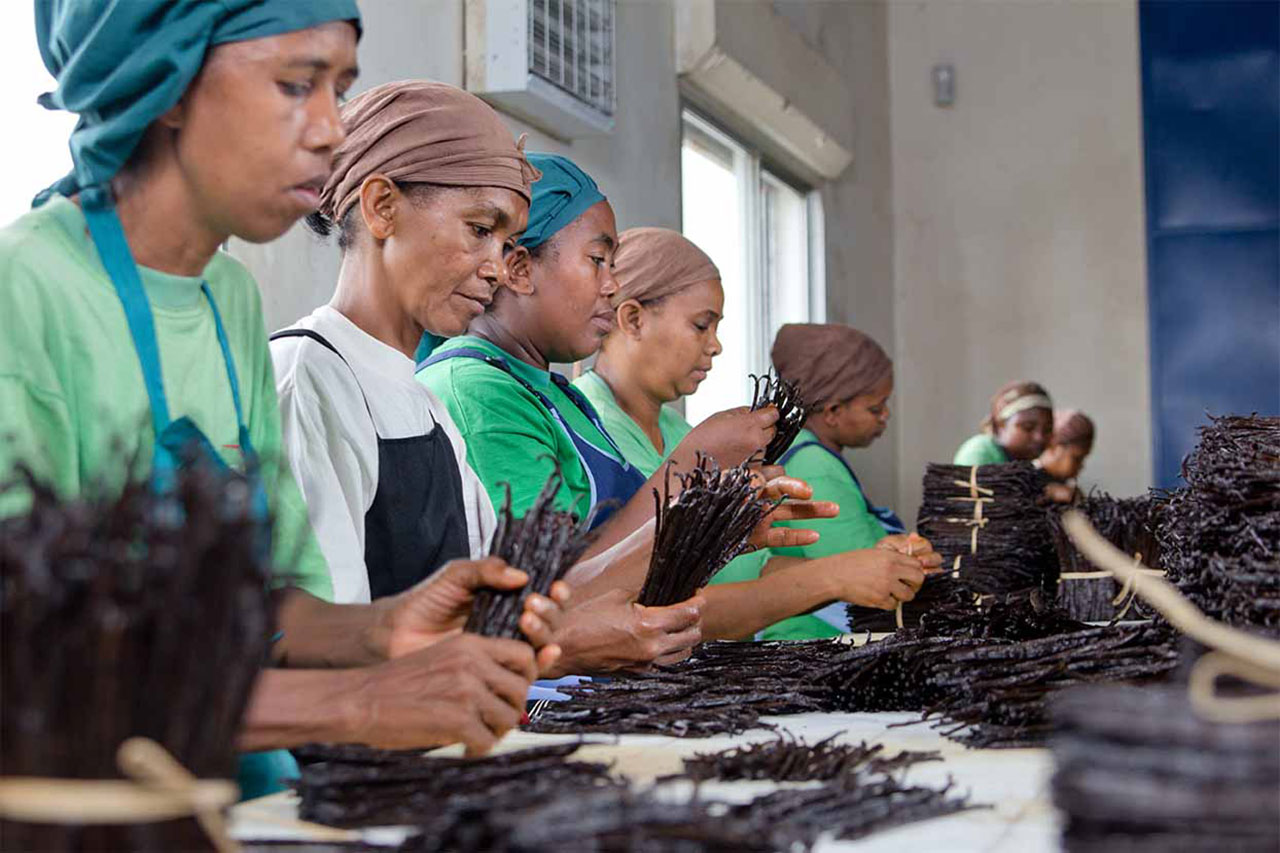 Workers pack vanilla at a spice factory in Prova, Madagascar, 2006. Credit: Barry Callebaut / Flickr
Workers pack vanilla at a spice factory in Prova, Madagascar, 2006. Credit: Barry Callebaut / Flickr
Where the Profits are Sweetest
When questioned openly by reporters, Girovani denied any involvement in the rosewood trade, describing all allegations as "entirely fictitious," and said "the commodity [rosewood] itself does not exist.” Minutes later, the company closed down its email account.
But in a letter to undercover reporters, Girovani had, in fact, confirmed the trader’s advice: “We declare that we can ensure the export of the goods ... under the official label of vanilla,” it said. “The real product shipped to the customer will be, of course, the one discuss[ed] by mail [rosewood].”
Why vanilla?
More than 70 percent of the world’s vanilla comes from Madagascar, and most of that from Sava. French colonizers planted orchards that today supply chefs, restaurants, and confectioners around the world.
The “acts of God” that swept through the island’s forests did not spare its vanilla plantations. Madagascar’s “vanilla crisis” made international headlines and, according to media reports, the average price per kilo of vanilla beans soared from $20 to $600. Its international market value now approaches that of silver.
As with rosewood, profits from vanilla reportedly accrue to a coterie of businessmen, not the farmers who harvest it.
Rosewood traders told reporters that some are now switching from stockpiled rosewood to the equally lucrative but less risky vanilla trade.
But the two businesses are not really separate, as a letter by President Rajaonarimampianina makes clear.
In the document, which was obtained by reporters, Rajaonarimampianina — then Finance Minister — asks the director of Madagascar’s Professional Banking Association to re-open the closed accounts of the Sava region’s illegal rosewood traders and financiers, warning of “disastrous consequences” for the local economy otherwise.
He explains that “the majority of the [rosewood traders] are also vanilla exporters, and contribute significantly to the funding of the harvest every season.”
Blocking their accounts would kill the vanilla trade, he writes, concluding that he would be grateful if banks would “provide the bank accounts needed for the [rosewood financiers’] activities.”
In essence, his letter admits that middlemen in the vanilla trade are also neck deep in illegal rosewood.
“You can’t tell if the money comes from vanilla or rosewood, as it’s mixed,” explained the trader with the 200-ton rosewood stockpile. “Most [rosewood traffickers]” were involved in both trades.
So it’s no accident that Mauritius, the alleged destination of much of Madagascar’s timber exports, is also a major transit destination for vanilla.
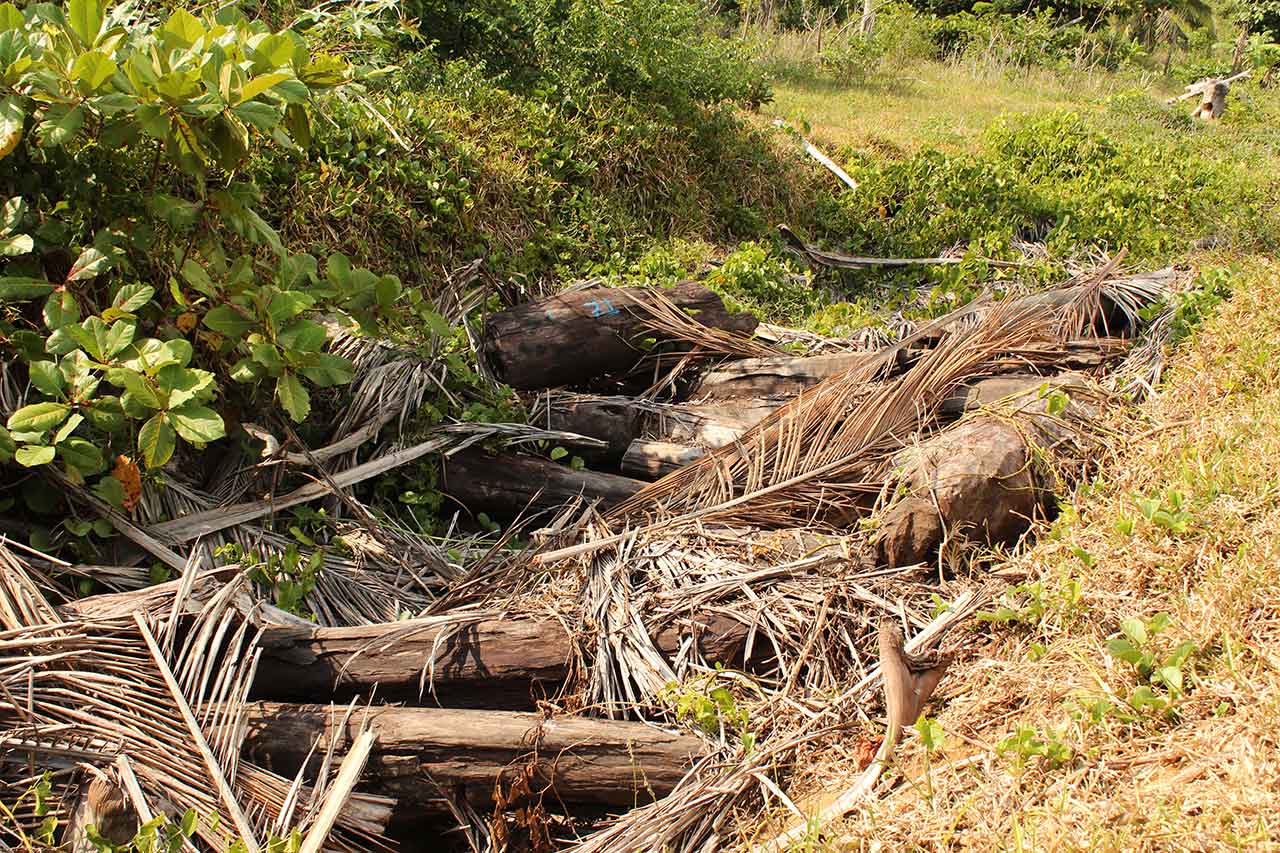 Illegally logged rosewood hidden in a ditch beneath a layer of palm leaves, Madagascar. Credit: OCCRP
Illegally logged rosewood hidden in a ditch beneath a layer of palm leaves, Madagascar. Credit: OCCRP
Chinese Appetites
There’s a reason undercover reporters chose to pose as a Chinese company. The country’s elite pays well for luxury furniture known as hongmu, often finely carved in the style of Chinese imperial dynasties.
A rosewood bed frame can reportedly sell for upward of $1 million. As not all species of rosewood are illegal to trade, the ambiguous Chinese term “紅木” (“Rosewood”) on the finished product avoids raising red flags.
The hunt for rosewood reached Africa’s shores as the once-protected rosewood forests of Southeast Asia have been steadily and stealthily logged out to meet Chinese demand. By 2012, almost 60 percent of China’s rosewood imports came from the continent.
“The Chinese send someone to talk to me,” one stockpile owner explained to reporters. “Between us and the Chinese is a Malagasy [native of Madagascar] who receives a commission as a middleman.” Such operations, he added, “are funded by foreign money.”
After leaving Madagascar and being shipped through small islands in the neighboring ocean, the wood is transported to various destinations in East Asia before reaching China. Some of these countries, such as Hong Kong and Singapore, are secretive tax havens. Others, like Myanmar, Laos, and Vietnam, are renowned for lax policing of maritime trade.
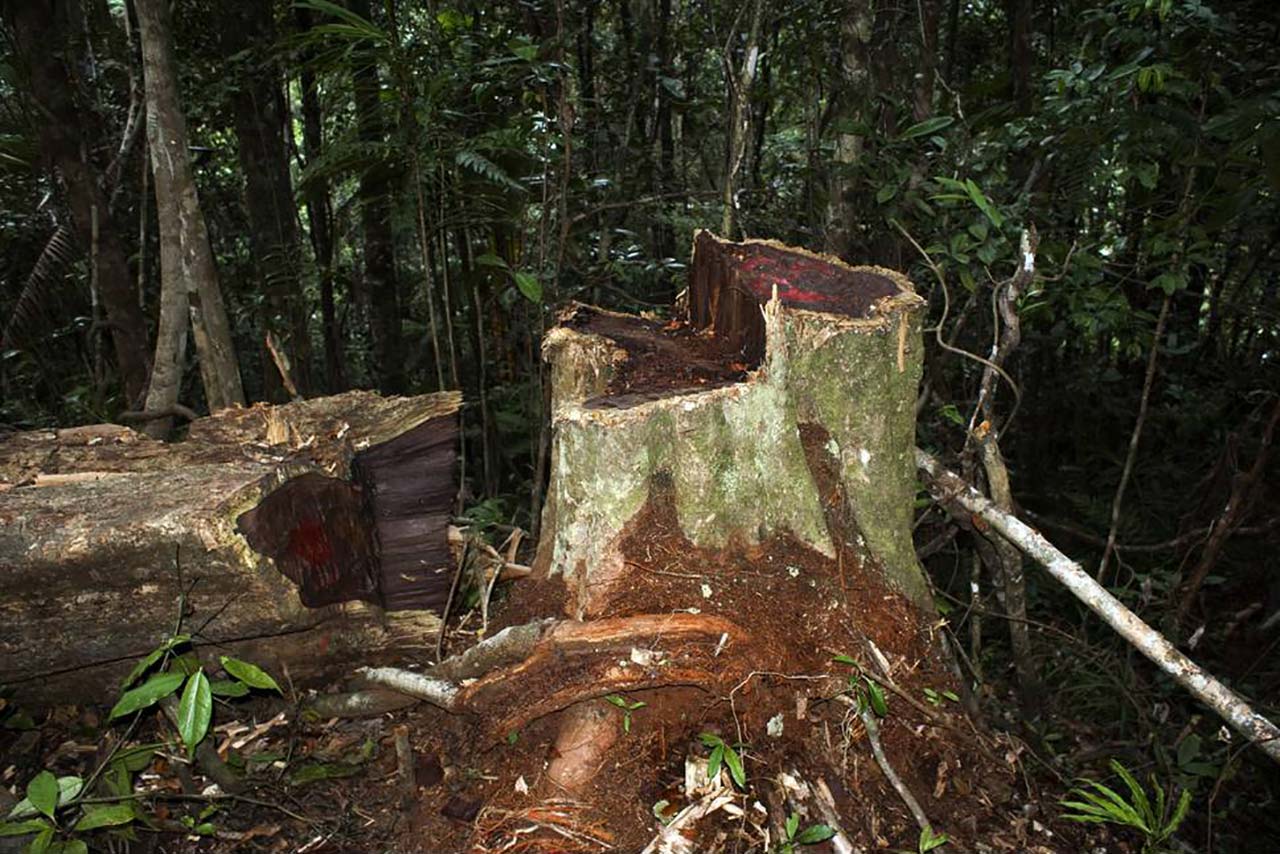 Illegally logged rosewood, showing the timber’s distinctive fiery red color, in Marojejy National Park, Madagascar, 2009. Credit: Wikimedia Commons
Illegally logged rosewood, showing the timber’s distinctive fiery red color, in Marojejy National Park, Madagascar, 2009. Credit: Wikimedia Commons
Where Silence Pays Well
Earlier this month, Madagascar’s government created a special court to investigate rosewood trafficking in a gesture seen as genuine by some and opportunistic by others.
Meanwhile, harassment and arrests of environmental activists continues apace: This June, a court convicted and fined Christopher Magnenjika, charging him with “rebellion” and insulting officials. Magnenjika is an activist with Lampogno, an NGO in the country’s northeast that fights against natural resource trafficking.
“There is a striking resemblance between Christopher’s case and that of other environmental activists in Madagascar, who have also faced accusations of ‘rebellion’ as an excuse to silence them,” Makmid Kamara, a director with Amnesty International, said in a prepared statement.
Heated Elections Approach
Several timber merchants, as well as officials from the Ministry of the Environment who opted to speak off the record, told reporters that they expected rosewood trafficking to increase prior to this November’s elections.
With Rajoelina having declared his candidacy and his predecessor, former President Ravalomanana, said to be considering running as well, that could be a heated vote.
Current President Rajaonarimampianina has stepped up the targeting of the opposition’s financial backers, such as millionaire Mamy Ravatomanga (who himself has been implicated in rosewood trafficking, though he has always proclaimed his innocence).
But the president appears to be losing clout. Madagascar’s Constitutional Court recently ruled on the appointment of a new prime minister to oversee the government until the elections. The court decision followed a demand by 53 parliamentarians for the president’s resignation after several protesters were killed by security forces for opposing new electoral laws, which critics claim favor Rajaonarimampianina.
In contrast, Razakamanarina, the president of Alliance Voahary Gasy, explained to reporters that after his organization exposed rosewood barons, the accused were able to make the problem disappear simply by placing a few calls to influential political figures.
Roger Pierre Ralala, Madagascar’s Secretary General in the Office of the Presidency, and representatives of the prime minister’s office opened reporters’ emails requesting comment for this story, but did not respond. Other key authorities refused to speak on the record.
Meanwhile, life grinds on for the people of Sava province, where Said Gilbert once made a scant living from logging rosewood. Scared by the criminal ties and illegality of the trade, he says he has moved on to different work.
In Madagascar’s villages, that is hard to come by.
Anti-corruption fighter Razakamanarina believes that unless the government develops rural Madagascar and offers citizens better prospects, cracking down on illegal rosewood logging will have little impact.
“History has shown that successive leaders cannot get rid of their bonds towards the mafia barons who have helped their political ascendance and keep them in power,” he says with a sigh. “They have already sold the country’s resources well in advance.”
With additional reporting by Stevan Dojcinovic.




